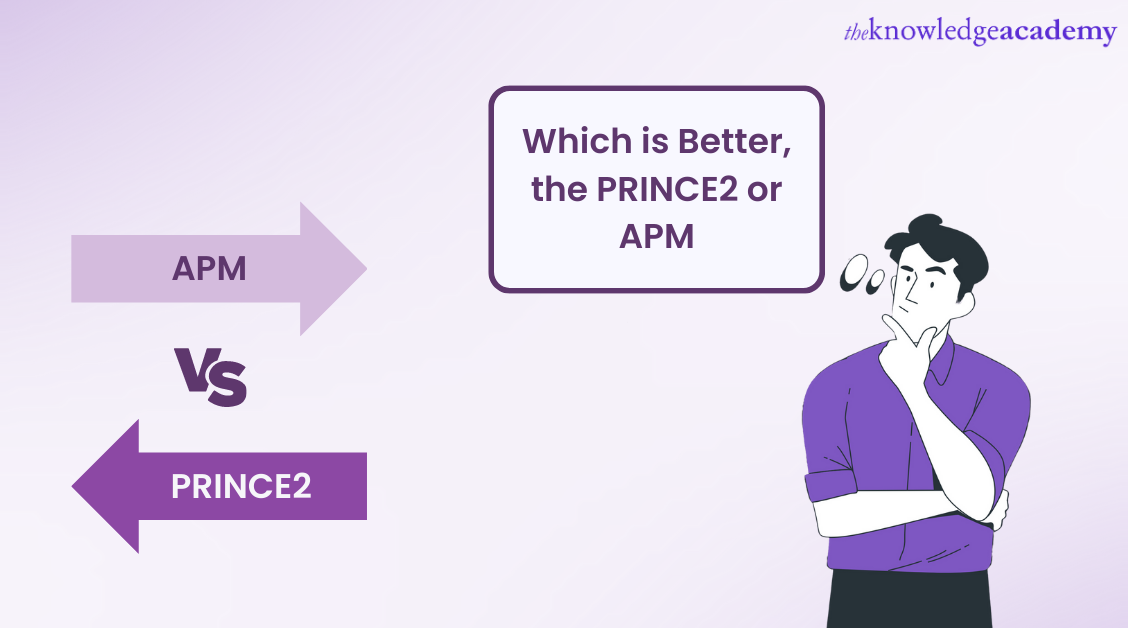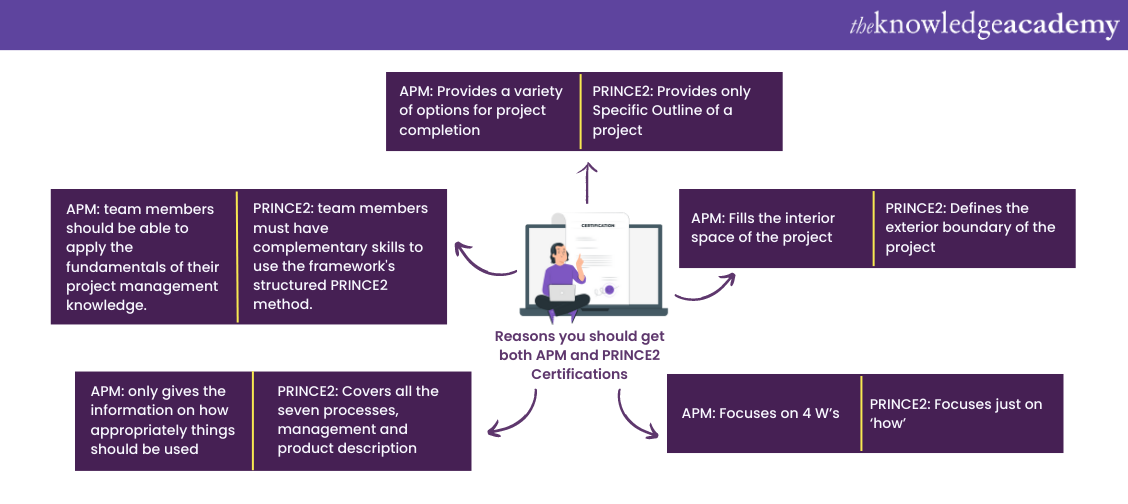We may not have the course you’re looking for. If you enquire or give us a call on +44 1344 203 999 and speak to our training experts, we may still be able to help with your training requirements.
Training Outcomes Within Your Budget!
We ensure quality, budget-alignment, and timely delivery by our expert instructors.

Today, certified Project Managers are in great demand. However, to become a successful Project Manager, you must have a certification to show your knowledge and expertise in the field. PRojects IN Controlled Environment (PRINCE2) and Association for Project Management (APM) are the two most common project management credentials. In this APM vs PRINCE2 blog, we compare the two and help you determine which is better.
Some employers demand a specific qualification from their employees. Since the two certifications are distinct, obtaining both rather than just one is preferable. An APM-certified Project Manager earns an annual salary of more than £38945. On the other hand, a PRINCE2 Practioner can earn an average yearly salary of £48000, according to Payscale. The project management certifications PRINCE2 and APM are both well-known. See the differences between them and discover why getting both certifications is better.
Table of Contents
1) What is an APM Certification?
2) What is PRINCE2 Certification?
3) Reasons you should get both APM and PRINCE2 Certifications
4) APM vs. PRINCE2 comparison: Which stands better?
5) Factors that decide which certification achievement is better for the organisation
6) Conclusion
What is an APM Certification?
The APM certification is a globally recognised certification for the Project Management field. It is a beginner's certificate that certifies that the holder knows Project Management. APM consists of Project Fundamental Qualification (PFQ) and Project Management Qualification (PMQ). Thanks to the certificate, you become familiar with the standard terms and conditions of projects.
Anyone who wishes to obtain a foundational understanding of Project Management may take the exam to obtain this certificate. The APM certificate will demonstrate one's dedication to the field of Project Management. Obtaining an APM certificate proves valuable when you are employed in a project-based setting and have a rudimentary or limited project management knowledge. Otherwise, it is also helpful when you want project manager recognition or to obtain a worldwide qualification in the project management field.

What is PRINCE2 Certification?
PRINCE2 is another certification that can be obtained to become a Project Manager. The first step, the simplest to obtain, is the PRINCE2 Foundation certification. It is a project management approach based on processes, and the Government of the United Kingdom and the private sector primarily use the certificate. Since this framework has adaptability, it is appropriate for any project type.
The PRINCE2 Certification consists of two levels: Foundational level and Practitioner Level. This Certification is beneficial if you are a fresher in Project Management. To qualify for the exam, you must only look through the material in the PRINCE2 manual. A project manager with PRINCE2 Certification can implement projects in a planned manner, which aids an organisation in functioning properly. Therefore, they seek professionals with this certification who can work in a regulated and consistent environment.
Learn to understand the PRINCE2 project definition, its characteristics by signing up for our PRINCE2® Foundation & Practitioner Training Course course now!
Reasons you should get both APM and PRINCE2 Certifications

A learner can pursue either an APM or a PRINCE2 Certification, whichever they are comfortable with. Obtaining both certifications can be beneficial for your career in several ways, some of which are as follows:
1) The APM offers a variety of options for completing the project, while PRINCE2 provides a specific outline of what to do in the project. Every industry and organisation uses different techniques in the project, which a Project Manager should be aware of because PRINCE2 does not give such techniques.
2) The APM lines the interior, while PRINCE2 defines the exterior. Your understanding of Project Management will be limited if you only know one. In other words, PRINCE instructs you on which tools to use and when, but it does not help you learn how to use them.
3) When managing a project, PRINCE2 focuses on who, where, what, and when—while APM only considers how. Project management techniques are excluded from PRINCE2; however, APM covers them in detail, allowing the two methodologies to coexist.
4) The seven processes, management, and product description are all covered by PRINCE2. It serves as a guide that should be tailored to your organisation, and it is useful to be aware of the crucial elements to consider when choosing a strategy. The APM certification does not comprehensively summarise what can be accomplished and how. It implies that the information must be used appropriately by professionals. It can be a challenging field for new comers.
5) A Project Manager with both certifications can increase their chances of finding a job. Your knowledge of Project Management skills will be complete if you possess both APM and PRINCE2 certificates. A team of people is required to complete a project successfully, and the team must have complementary skills to use the framework's structured PRINCE2 method.
6) While APM does not specify a specific approach, it provides a framework for managing the project. It includes information on critical areas where the project should be completed. The training, research, publications, and events of those with APM certifications are recognised. The team members working in the organisation should be able to effectively apply the fundamentals of their Project Management knowledge.
7) Finally, your earning potential and career advancement chances will also be improved by holding both certifications. Both certification programmes teach useful methods and principles in various sectors and applications. Therefore, having both certifications will make it easy for you to launch your career.
Understand the differences between Project Work vs. BAU Work and the common Agile methodologies by signing up for our PRINCE2 Agile® Practitioner course now!
APM vs. PRINCE2 comparison: Which stands better?
The following points can help you understand and determine which of the two certifications is better and which one you should pursue:
1) PRINCE2 is a lone methodology, an infallible manual with predetermined content that only addresses Project Management. In contrast, APM provides the knowledge you need to select the best project methodology for your company's needs by covering a wide range of concepts related to the project, programme, portfolio, and risk management.
2) In PRINCE2, the Project Management methodologies and procedures are approached in a broader manner. Templates are offered for crucial project data and documentation. Although it assists in monitoring and planning projects, PRINCE2 doesn't specifically outline how to do them. For this, many organisations have developed proprietary tools and techniques. As a result of its fewer rigid requirements in this area, the PRINCE2 certification is ideal for organisations. APM, on the other hand, examines your capacity for effective project management. It covers various subjects, including project management's "people" facets. Additionally, APM teaches planning and monitoring methods like Earned Value and Critical Path, which PRINCE2 purposefully omits.
3) PRINCE2 only offers a general approach, whereas APM delves deeper and considers project-specific issues like procurement, budgeting, and portfolio management. Yet each qualification has its advantages, which is why they complement one another.
Learn to understand how to develop and manage teams, identify and monitor risk by signing up for our APM Project Professional Qualification PPQ course now!
Factors that decide which certification achievement is better for the organisation
You can consider the following factors while deciding which of the two certifications is better for your career and your organisation.
a) If you want to completely revamp a current project management process or start a new one, consider applying PRINCE2. It should be used to be specific and appropriate to your organisation. To increase the likelihood that the PRINCE2 method will be implemented successfully in your organisation, consider providing training for project members at upper and lower levels of project managers.
b) If you possess the necessary knowledge and abilities to carry out projects in your organisation, determine your project managers' overall competence by evaluating or benchmarking them. Consider APM in this instance if this indicates that available knowledge and skills need to be improved.
c) If there is a lack of necessary abilities and project management techniques, start by combining the APM with PRINCE2 to give project teams a step-by-step process. This will help to embed an overall framework and project management principles.
Conclusion
After reading this blog, you will know what the APM and PRINCE2 certification comprises. In this blog, we also discussed the reasons for attaining both certifications and understood the differences between APM and PRINCE2. As PRINCE2 and APM depend on one another, they are also seen as similar. PRINCE2 emphasises frameworks, while APM focuses on comprehensive project management knowledge. In order to complete a project, APM offers the necessary tools, but PRINCE2 provides the procedures or instructions to use those tools.
Understand the structure of organisation and projects, and project life cycle by signing up for our APM PMQ For PRINCE2 Practitioners course now!
Frequently Asked Questions
Upcoming Project Management Resources Batches & Dates
Date
 APM PMQ
APM PMQ
Mon 6th Jan 2025
Mon 13th Jan 2025
Mon 20th Jan 2025
Mon 27th Jan 2025
Mon 3rd Feb 2025
Mon 10th Feb 2025
Mon 17th Feb 2025
Mon 24th Feb 2025
Mon 3rd Mar 2025
Mon 10th Mar 2025
Mon 17th Mar 2025
Mon 24th Mar 2025
Mon 31st Mar 2025
Mon 7th Apr 2025
Mon 28th Apr 2025
Mon 12th May 2025
Mon 19th May 2025
Mon 2nd Jun 2025
Mon 16th Jun 2025
Mon 30th Jun 2025
Mon 14th Jul 2025
Mon 28th Jul 2025
Mon 11th Aug 2025
Mon 18th Aug 2025
Mon 1st Sep 2025
Mon 8th Sep 2025
Mon 15th Sep 2025
Mon 22nd Sep 2025
Mon 29th Sep 2025
Mon 6th Oct 2025
Mon 13th Oct 2025
Mon 20th Oct 2025
Mon 27th Oct 2025
Mon 3rd Nov 2025
Mon 10th Nov 2025
Mon 17th Nov 2025
Mon 24th Nov 2025
Mon 1st Dec 2025
Mon 8th Dec 2025
Mon 15th Dec 2025







 Top Rated Course
Top Rated Course


 If you wish to make any changes to your course, please
If you wish to make any changes to your course, please


